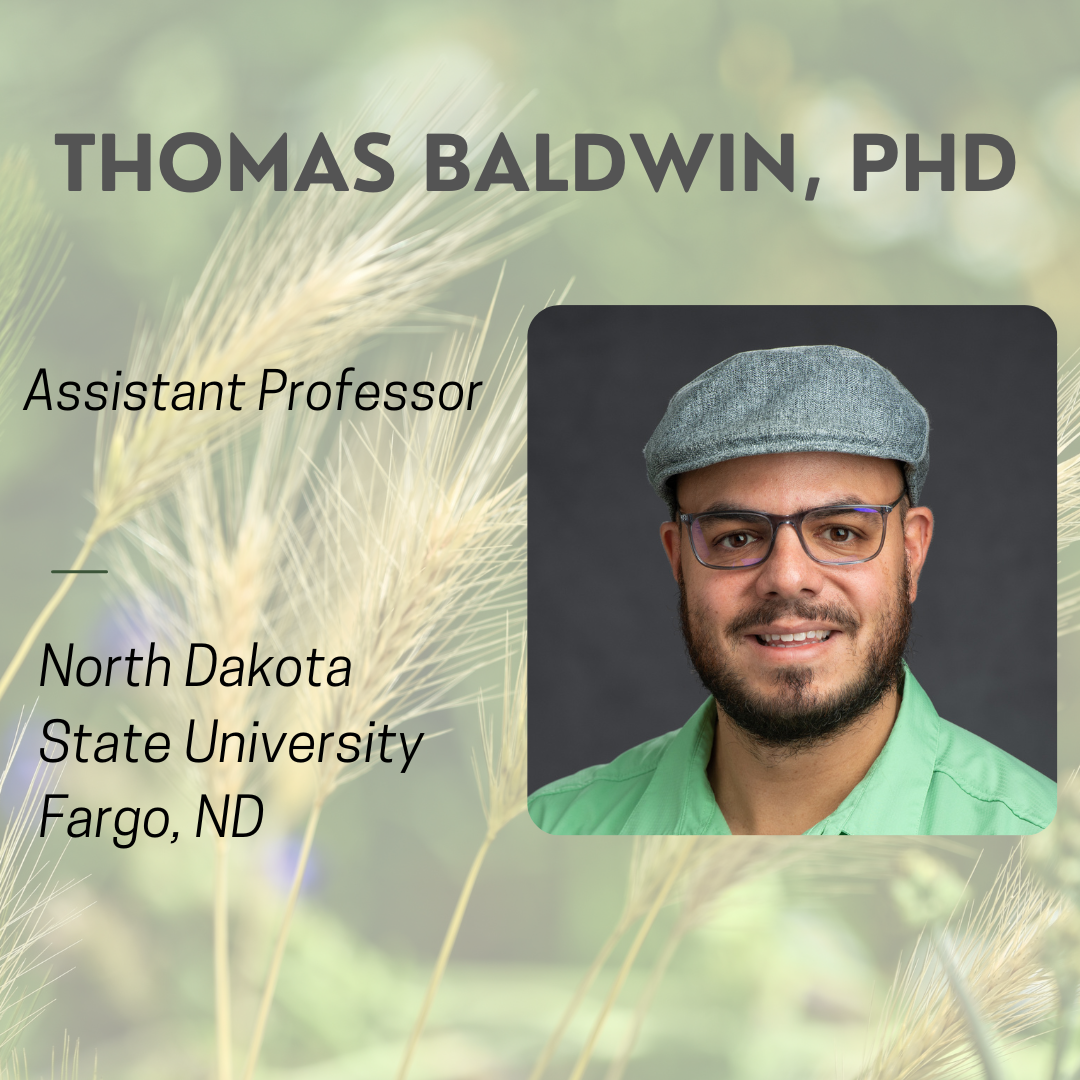Featured Researcher Bio - Thomas Baldwin 2023

Meet Thomas Baldwin, PhD, assistant professor of barley pathology at North Dakota State University (NDSU). His research focuses on identifying the underlying mechanisms of host resistance to Fusarium head blight and other diseases in barley. He also manages the North American Barley Evaluation Nursery supported by the U.S. Wheat and Barley Scab Initiative (USWBSI).
Baldwin has been active in the USWBSI since 2014 when he first attended one of the National Fusarium Head Blight Forums as a post-doctoral researcher. Since then, he has presented at every Forum and published numerous papers on FHB. He currently serves as the USWBSI Barley Coordinated Project Committee chair.
Wonders of Nature Are the Driving Force
Baldwin grew up in the picturesque region of Catskill, New York where the Hudson River and surrounding forests provide a beautiful backdrop. During his childhood, he developed a profound passion for nature and the environment. He attended the State University of New York College of Environmental Science and Forestry (SUNY-ESF) and earned his bachelor’s degree in plant biotechnology.
With a desire to understand and fight Fusarium diseases affecting cereals, Baldwin attended the University of Georgia, where he obtained his doctorate degree studying Fusarium seedling blight in maize and exploring the role mycotoxins play in translocation of metabolites and the pathogen itself during infection.
Following completion of his Ph.D., Baldwin obtained a post-doctoral research fellowship at the USDA-ARS Small Grains and Potato Germplasm Research Unit in Aberdeen, Idaho under the guidance of Dr. Phil Bregitzer. Here, he did extensive research on FHB in barley, exploring innovative control methods such as RNAi and host-induced gene silencing (HIGS) while also screening barley breeding lines for FHB resistance.
Throughout his career, Baldwin has been inspired by multiple mentors including Dr. Annette Kretzer (SUNY-ESF), Dr. Peter Moffett (Boyce Thompson Institute), Dr. Anthony Glenn and Dr. Scott Gold (University of Georgia/USDA-ARS), and Dr. Phil Bregitzer (USDA-ARS). Through their dedication, these mentors provided Baldwin with the resources and skills to meet the challenges he faces researching FHB. His fellow colleagues at NDSU continue to inspire him and he is grateful to Dr. Jack Rasmussen and the North Dakota Barley Council, which supports his current position.
“The wonders of nature and of fungi are also a driving force to study FHB on barley,” says Baldwin.
Revolutionizing FHB through Collaboration
Baldwin’s favorite thing about the USWBSI is the collaboration and its interdisciplinary nature. “Being a part of the USWBSI offers me the opportunity to collaborate with fellow researchers, industry experts, and stakeholders who share a common goal of reducing the impact of FHB on wheat and barley production,” says Baldwin. The interdisciplinary aspect of the USWBSI is extremely valuable by bringing together experts in multiple fields to address the complex challenges posed by FHB.
Baldwin is currently working on three barley projects associated with the USWBSI. His favorite is characterizing the barley microbiome in response to FHB and uncovering unknown interactions. This project is currently funded under the Transformational Science Research Category and is a collaboration between himself, Dr. Barney Geddes (NDSU), and Dr. Briana Whitaker (USDA-ARS). Baldwin is captivated by this project’s potential to “revolutionize” our understanding of the dynamics of FHB. In addition to this project and coordinating the NABSEN, he is also working on developing a cost-effective Fusarium biomass assay for use by breeders, farmers, and maltsters.

Relationships Are Key to Success
Baldwin has gained many valuable insights during his experience, and he gladly shares these with his graduate students. One piece of advice he has for graduate students and early career professionals is to develop strong relationships with your mentors and seek out opportunities to collaborate, like those through the USWBSI. If you build a network of peers and mentors, you can broaden your perspectives and enhance your research outcomes.
If you are interested in learning more about Dr. Thomas Baldwin's research, visit his faculty webpage.
You can also check out the series of previous USWBSI Featured Researchers.
